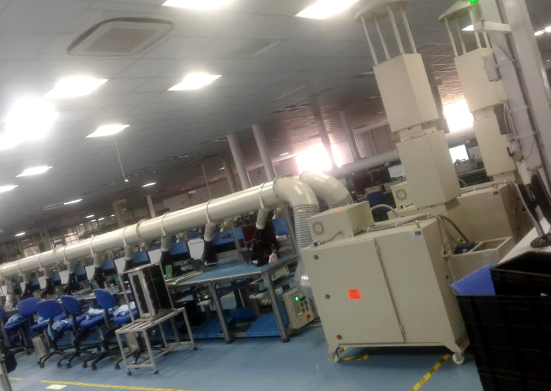The industrial landscape is teeming with processes that emit fumes, from welding and soldering to laser cutting and chemical processing. These fumes are not just a nuisance; they pose significant health risks and contribute to environmental pollution. As a result, there is an ever-growing emphasis on air pollution control in industrial environments. One of the most effective solutions to this challenge is the implementation of fume extraction systems. In this blog post, we will delve into the top advantages of using fume extraction systems, with a focus on their varied applications such as welding fume extractors and soldering fume extractors.
- Enhanced Worker Health and Safety: The most significant advantage of using a fume extractor is the protection it offers to workers’ health. Fume extraction systems are designed to capture a wide array of hazardous particles and gases at the source, preventing them from entering the breathing zones of employees. This is critical in welding applications where a welding fume extractor can significantly reduce the exposure to harmful substances like manganese, nickel, and chromium, which are known carcinogens.
- Compliance with Health and Safety Regulations: Adhering to occupational health and safety regulations is not just ethical but also a legal requirement. Fume extraction systems help businesses comply with strict air quality standards set by various health and safety organizations. By doing so, companies can avoid costly fines and legal issues while demonstrating their commitment to providing a safe workplace.
- Improvement in Air Quality: Air pollution control is not just about the air outside; it’s also about maintaining the quality of indoor air. Fume extractors play a crucial role in filtering out toxic particles and gases, thereby improving the overall air quality within the facility. This is essential not only for health reasons but also for maintaining product quality, as contaminants in the air can affect manufacturing processes.
- Increased Productivity: When employees are healthy and work in a comfortable environment, their productivity naturally increases. Fume extraction systems contribute to creating a cleaner, safer, and more pleasant working environment, which can lead to enhanced performance and reduced downtime due to health-related absences.
- Long-term Cost Savings: Investing in a high-quality fume extraction system can lead to substantial long-term cost savings. By maintaining a cleaner working environment, companies can save on health care costs, avoid productivity losses, and extend the lifespan of their equipment. Moreover, such systems can prevent the accumulation of combustible dust, which poses a significant fire risk.
- Versatility in Applications: Modern fume extraction systems come in various designs to suit different applications. For instance, a soldering fume extractor might be compact and designed to be placed on a workbench, whereas a welding fume extractor may be larger and more robust to handle the intense fumes from welding operations. This versatility ensures that businesses can find a solution that fits their specific needs.
- Energy Efficiency: Many fume extraction systems are designed with energy efficiency in mind. By using energy-efficient motors and smart systems that adjust the extraction rate based on the volume of fumes produced, businesses can minimize their energy consumption. This not only reduces costs but also supports sustainability efforts.
- Protection of Equipment: Fumes and particulate matter can damage sensitive machinery and electronic components. By removing these airborne contaminants, fume extraction systems can prolong the life of equipment, which can be particularly crucial in high-tech industries where precision and reliability are paramount.
- Reduction of Environmental Impact: Fume extraction systems don’t just protect people and products; they also play a role in environmental protection. By capturing harmful emissions before they can be released into the atmosphere, these systems contribute to reducing a company’s carbon footprint and promoting cleaner manufacturing processes.
The implementation of fume extraction systems presents a multitude of advantages for any industry where air quality is a concern. From protecting worker health to ensuring compliance with regulations, and from increasing productivity to saving on long-term costs, the benefits are clear. Whether it’s a welding fume extractor for heavy-duty applications or a soldering fume extractor for precision work, there is a fume extraction solution out there that can significantly improve both the working environment and the bottom line. Investing in such systems is not just a regulatory necessity; it’s a strategic decision that can lead to a healthier, more productive, and more sustainable business.





